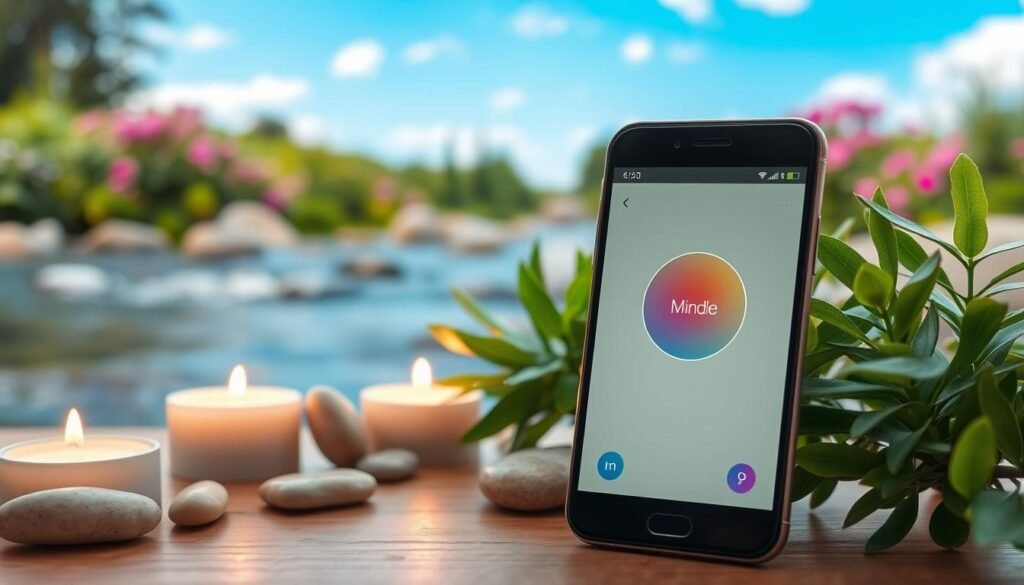
Best Mindfulness Apps for Beginners: Find Your Inner Peace
Did you know you can reduce stress and anxiety, sleep better, and focus more with just a few minutes a day? Mindfulness apps for beginners can help you do this. These apps guide you to be present and fully engaged in the moment. This practice has many benefits and can be started with guided apps1.
Meditation apps have grown in popularity because of mindfulness’s benefits. Apps for beginners offer guided meditations to help you find peace and improve your well-being.
Some top apps for 2023 offer guided meditations, nature sounds, and breathing exercises1. Others have over 500 meditations, sleep stories, and courses from experts worldwide. They also track your progress and remind you to meditate2.
When picking a meditation app, think about what you need. Look at the type of meditation, your experience level, features, price, reviews, and if it works on your device1.
Key Takeaways
- Mindfulness apps for beginners can help reduce stress and anxiety, improve sleep, and increase focus.
- Guided mindfulness apps provide a structured approach to mindfulness, helping you find inner peace and improve overall well-being.
- Some mindfulness apps offer a wide range of guided meditations, nature sounds, and breathing exercises.
- Others provide personalized user statistics and reminders to meditate.
- When choosing a meditation app, consider the type of meditation, level of experience, features, price, reviews, compatibility, accessibility, and personal preferences.
- Meditation apps have become increasingly popular in recent years, with many options available for iPhone and Android.
- Regular mindfulness meditation can lower cortisol levels associated with stress and improve emotional well-being1.
Introduction to Mindfulness and Its Benefits
Mindfulness is a way to calm the mind by focusing on the present. It uses techniques like deep breathing and repeating mantras3. It’s great for beginners because it helps them understand themselves better.
By using mindfulness tools daily, people can feel less stressed and anxious. They also sleep better and focus more. It’s all about being in the moment without judgment3.
Starting with mindfulness is easy. Just take a few minutes each day to be present. You can meditate, do yoga, or just breathe. Studies show mindfulness can make you feel as good as antidepressants4.
What is Mindfulness?
Mindfulness means being aware in the present moment. It’s about paying attention without judgment, as Jon Kabat-Zinn says3. You can learn it by practicing regularly with tools like meditation apps.
Importance of Mindfulness for Beginners
Mindfulness is key for beginners. It helps them understand themselves and the world better. By starting with simple practices, beginners can feel less stressed and anxious. They also improve their overall well-being4.
Using mindfulness tools and resources can help beginners. They provide a solid base for a lifelong journey of self-discovery.
Why Use Mindfulness Apps?
Mindfulness apps are easy to use and can be accessed anywhere, anytime5. They are great for beginners who want to add mindfulness to their daily life. With the best apps, finding guided practices and resources is simple.
These apps offer personalized suggestions based on what you want to achieve, like learning to meditate or reducing stress5. They also have a variety of meditations, including ones for beginners. For example, you can check out mindfulness app comparison websites to find the perfect app for you.
Mindfulness apps track your progress, like how long you meditate and how many sessions you do6. This keeps you motivated and consistent. Many apps also offer free trials or subscriptions, so you can try different ones to see which fits you best. Using mindfulness apps is a great way to start a mindfulness practice and improve your well-being.
Top Mindfulness Apps for Beginners
Choosing the right mindfulness app can be tough with so many options. But some apps really stand out. Insight Timer, Headspace, and Calm are great for beginners. They offer guided mindfulness practices and meditation sessions7.
These apps give you tools to manage stress and anxiety. You can find meditation sessions, sleep stories, and breathing exercises. They help you relax and feel better8.
Some key features include:
- Guided meditation sessions
- Sleep stories and calming music
- Breathing exercises and mindfulness practices
- Personalized mental health coaching and tracking
Using these apps can help you start a mindfulness practice. This can improve your mental health and reduce stress7. Their easy-to-use interfaces and wide range of features make them perfect for beginners8.
Finding the best mindfulness app for you depends on your needs and likes. By looking into these top apps, you can pick the one that fits you best. Then, you can begin your mindfulness journey7.
Insight Timer: Features and Benefits
Insight Timer is a top mindfulness app with lots of free stuff. It has meditation, music, and talks9. It’s great for beginners because it has many meditation types to help with different goals.
The app has over 146,000 guided meditations, talks, podcasts, and music9. It even adds 80+ new tracks every day10. This shows it’s serious about helping beginners.
Insight Timer offers:
- Free access to a huge library of meditations and talks
- Diverse meditation practices, including meditation, breathwork, sleep exercises, and courses
- Options for meditation, breathwork, sleep exercises, courses, exercises targeting workplace stress, and “Breathe” activities9
It has the biggest free meditation library online10. With over 118,000 free guided meditations11, it’s perfect for those looking for lots of mindfulness resources. It has 19 million users11 and content in over 50 languages11. This shows it’s popular and diverse.

Headspace: Features and Benefits
Headspace is a top mindfulness app known for its easy-to-use interface and customizable meditation sessions. It’s perfect for those new to mindfulness, helping them build a regular practice. This practice can reduce stress and anxiety12. The app also offers Sleepcasts, guided meditations, focus exercises, music, and courses for all levels, meeting various needs and goals13.
Headspace is designed to be accessible, with features like screen reader, keyboard navigation, and colorblindness adjustments. It also has Closed Captioning and Audio-Narrated Descriptions of Key Visual Elements in English12. It has meditations for kids, meditations for different goals and situations, emergency sessions, and timed meditations from 5 to 120 minutes13. With its wide range of features and options, Headspace is great for those looking for meditation apps that fit their unique needs.
Some of the key features of Headspace include:
- Personalized meditation sessions
- Guided meditations for sleep, focus, and relaxation
- Mindfulness courses for beginners and advanced users
- Accessibility features for users with disabilities
Overall, Headspace is a top-notch learning mindfulness app. It offers a wide range of features and benefits. It’s an ideal choice for those wanting to add mindfulness and meditation to their daily lives. It’s considered one of the best mindfulness apps available13.
Calm: Features and Benefits
Calm is a top mindfulness app with sleep stories and breathing exercises14. It has over 100 million users worldwide14. It’s perfect for beginners who have trouble sleeping. The app has hundreds of calming exercises, breathing techniques, and sleep stories told by celebrities15.
Some of the key features of Calm include:
- Sleep Stories: Calm offers over 100 exclusive Sleep Stories, narrated by well-known talents such as Matthew McConaughey and Stephen Fry16.
- Breathing Exercises: The app features six types of breathing exercises focused on relaxation, balance, restoration, focus, energizing, and unwinding15.
- Music Tracks: Calm provides music tracks categorized into focus, lullabies, relaxation, sleep, soundscapes, and nature melodies15.
Calm is a top choice for beginners, with many mindfulness resources and practices14. It has soothing music and nature sounds to help you relax and get ready for sleep. You can download Calm, with options for a monthly subscription at $14.99, a yearly subscription at $69.99, and a Lifetime subscription at $399.9916.
Calm is a great option for those wanting to improve their sleep and well-being. With its features, Calm is a valuable tool for beginners14.
| Feature | Description |
|---|---|
| Sleep Stories | Over 100 exclusive Sleep Stories, narrated by well-known talents |
| Breathing Exercises | Six types of breathing exercises focused on relaxation, balance, restoration, focus, energizing, and unwinding |
| Music Tracks | Music tracks categorized into focus, lullabies, relaxation, sleep, soundscapes, and nature melodies |
Other Notable Mindfulness Apps
Exploring mindfulness applications means looking at many options. Apps like Simple Habit and Smiling Mind stand out with their special features and benefits17. Simple Habit has a free version and paid options, while Smiling Mind is free for everyone17.
These learning mindfulness app choices meet different needs and goals. The rise in mindfulness applications is clear, with over 2,000 new apps from 2015 to 201818. This variety means there are many best mindfulness apps to try, each with its own benefits and drawbacks.
Features like guided meditations, personalized sessions, and tracking are common. For instance, Insight Timer has over 80,000 free guided meditations from experts18. When picking a mindfulness app, think about what matters most to you and check out the options.
| App | Features | Pricing |
|---|---|---|
| Simple Habit | Guided meditations, personalized sessions | Free version, subscription options |
| Smiling Mind | Guided meditations, structured programs | Completely free |
How to Choose the Right Mindfulness App
Choosing the right meditation app can feel overwhelming. It’s important to think about what you want to achieve with mindfulness19. Apps like Insight Timer and Calm offer many guided meditations and tools to help you start19.
Look at the app’s user experience and if it works with your device. Apps like Simple Habit and Smiling Mind have meditations for busy people and different ages20. Others, like Headspace and Ten Percent Happier, let you customize your meditation sessions and have a big library of guided meditations19.
Here are some things to think about when choosing an app:
- Goals: What do you want to achieve through mindfulness practices?
- User experience: Is the app easy to navigate and use?
- Compatibility: Is the app compatible with your device and operating system?
- Features: What features are important to you, such as guided meditations, sleep stories, or movement content?
By thinking about your goals and these factors, you can find the right mindfulness app for you20.

Success comes from finding an app that fits your life. With the right app, you can build a mindfulness habit. This can lead to less stress, better sleep, and more well-being19.
Getting Started with Mindfulness Practices
To start with mindfulness, you need a quiet space and a set time each day. Use mindfulness resources like guided meditations to help. Studies show mindfulness improves sleep, reduces stress, and boosts focus21.
Beginners should start small and be regular. Start with short meditations and grow as you get more comfortable. Apps like Insight Timer and Headspace offer guided meditations to help you begin. Try different types of meditations to find what suits you best.
Adding mindfulness to your day can be simple. Just take a few minutes to focus on your breath or body sensations. You can also practice mindfulness while eating or walking. By making mindfulness a daily habit, you can enhance your well-being. The mindfulness resources available can guide you on your journey21.
Tips for Making the Most of Mindfulness Apps
When using best mindfulness apps, it’s key to be regular and try out various methods22. Being consistent helps build a strong mindfulness habit. Trying different techniques helps you find what works best for you.
To get the most from meditation apps, consider these tips:
- Begin with short sessions and slowly increase the time as you get more comfortable.
- Try different meditation types, like guided or unguided, to see what fits you.
- Use a learning mindfulness app that tracks your progress and offers insights to keep you motivated23.
By following these tips and using best mindfulness apps regularly, you can build a strong mindfulness habit. This can greatly improve your well-being22. Always pick an app that matches your goals and likes. Don’t hesitate to try different apps until you find the perfect one for you.

Potential Challenges and How to Overcome Them
Starting mindfulness can be tough for beginners. They often face grasping, aversion, or restlessness24. To beat this, making mindfulness a daily habit is key. Use tools like guided meditation and breathing exercises.
Another hurdle is sticking to a routine. Busy lives and lack of motivation can make it hard. But, with the right apps and resources, staying consistent is easier25. Apps like Calm and Headspace help with this, providing guided sessions and tracking.
Common issues for newbies include:
- Physical discomfort or restlessness during meditation
- Doubt and uncertainty about the effectiveness of mindfulness practices
- Difficulty in creating a consistent routine
To tackle these, start small and be patient. Try different mindfulness tools and resources. Check outmindfulness articlesandapp reviews to find what suits you.
By facing these challenges head-on and using the right tools, beginners can build a strong mindfulness practice. This leads to better mental and emotional health.
The Role of Community in Mindfulness
Mindfulness is often done alone, but community is key. Online groups and support help people feel connected and motivated. Research shows many mindful communities worldwide, like in Seattle, the UK, and North Carolina26.
These groups help with stress, sleep, and talking better. They offer a lot of benefits.
Online communities and support have many advantages. For example:
- Access to guided practices and resources
- Connection with like-minded individuals
- Motivation and accountability
Apps like Headspace and Calm offer guided meditations and forums. In 2021, Calm became the top meditation app with over 100 million downloads27. This shows how much people value mindfulness and community.

Benefits of Group Practices
Group mindfulness practices improve focus and flexibility. They also reduce negative effects of interactions. Practicing with others builds a sense of community and improves health26.
Apps and online communities make it easy to add mindfulness to daily life.
Conclusion: Your Journey to Mindfulness
Starting your mindfulness journey is a gradual process.
Start small and build gradually
– even just a few minutes of meditation each day can make a significant difference28. Be patient with yourself as you grow.
Embrace the Process of Growth
Mindfulness is not about being perfect. It’s about growing self-awareness and finding inner peace29.
The mindfulness apps mentioned in this article are great tools for your practice. Check out the wide variety of, from guided sessions to calming sounds, and find what you like28. With regular practice and an open mind, you’ll see the benefits of mindfulness, like less stress, better focus, and emotional well-being29.
Your mindfulness journey is special to you28. Enjoy the ups and downs, and celebrate every small step29. By making mindfulness a part of your daily life, you’ll find more peace and strength. This will help you face life’s challenges more easily and clearly.
FAQ
What is mindfulness?
What are the benefits of mindfulness for beginners?
Why should beginners use mindfulness apps?
What are the top mindfulness apps for beginners?
What features does Insight Timer offer?
What makes Headspace a good choice for beginners?
How does Calm help beginners with mindfulness?
What other notable mindfulness apps are worth exploring?
How can beginners choose the right mindfulness app?
What tips can help beginners get started with mindfulness practices?
How can beginners make the most of mindfulness apps?
What challenges might beginners face with mindfulness apps?
How can the role of community enhance a beginner’s mindfulness practice?
Source Links
- The Power of Meditation and Apps that Can Get You Started | The Lanby
- The Mindfulness App
- Getting Started with Mindfulness
- Mindfulness Apps and Resources – LEARN EAP | Anthem
- I Tried The Mindfulness App to Dip My Toe Into the Meditation Pool—and Now I Don’t Want to Get Out!
- Best Meditation Apps of 2024
- Headspace: Sleep & Meditation
- THE BEST MEDITATION APPS – Cat Meffan
- I Turned to Insight Timer to Help Me Destress and Build Healthy Sleep Habits—Here’s How It Went
- The 6 Best Meditation Apps in 2024
- Insight Timer App, Your Meditation Pal — Ivy+Light
- Headspace
- The Best Meditation Apps
- Calm – Sleep, Meditate, Relax – Apps on Google Play
- 2024 Calm Review: We Tested the Popular Meditation App
- Calm
- 5 Best Mindfulness Apps – PsychologyJobs.com
- Free Meditation Apps Worthy of Your Attention
- How to choose a meditation app that’s right for you
- Mindfulness Apps | Plum Village
- Building a More Mindful Meditation App
- The Future of Mindfulness Apps (and how to get there) – Buddhify
- Common Issues and Difficulties with Meditation
- Meditation Apps and the Unbearable Whiteness of Wellness
- Chapter 28. Spirituality and Community Building | Section 8. Mindfulness and Community Building | Main Section
- Use of Mobile Apps and Online Programs of Mindfulness and Self-Compassion Training in Workers: A Scoping Review
- Mindfulness Apps How Well Do They Work
- Mindfulness meditation with apps, gadgets and technology: How to start meditating






